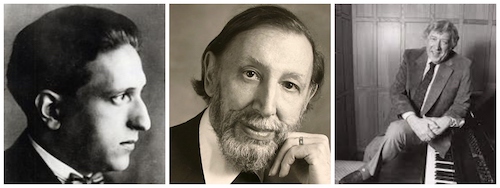By Daniel Hathaway
. Musical theater continues in Wooster, chamber music in Cleveland Heights.
. Almanac: Remembering Pavel Haas, Alan Hovhaness, and Gunther Schuller (pictured)
HAPPENING TODAY:
At 2:00, Ohio Light Opera presents How To Succeed in Business Without Really Trying in Freedlander Theatre on the campus of The College of Wooster, and at 7:30, ChamberFest Cleveland presents “Mozart, Brahms, and Redemption” at Disciples Church in Cleveland Heights. Details in our Concert Listings.
TODAY’S ALMANAC:
This date in classical music history marks anniversaries for composers Alan Hovhaness, Pavel Haas, Gunther Schuller, Johann Christoph Friedrich Bach, Nikolai Rimsky-Korsakov, Judith Bingham, and Lalo Schifrin, as well as the premieres of Richard Wagner’s Die Meistersinger von Nurnberg and Richard Strauss’s Death and Transfiguration.
We’ll focus on the 20th-century trio of Haas, Hovhaness, and Schuller.
On June 21 of 1899, Czech composer Pavel Haas was born in Brno, and died at the hands of the Nazis 45 years later at Auschwitz. Watch a video of Hass’s A Study for Strings that includes documentary images of his life and the Theresienstadt concentration camp. Another video features the string quartet that bears his name in a performance of his Quartet No. 2, “From the Monkey Mountains,” Op. 7 (1925, the version with percussion).
June 21 marks the death of the super-prolific Armenian American composer Alan Hovhaness in Seattle in 2000. Cleveland harpist Yolanda Kondonassis has recorded an entire CD of his works, many of which aren’t widely known. Fans of Hovhaness will already treasure his Symphony No. 2, “Mysterious Mountain,” played here by Gerard Schwarz and the All-Star Orchestra, and his brief but moving Prayer of St. Gregory (click here to hear a performance by trumpeter Wynton Marsalis).
And on this date in 2015, multi-faceted composer and musician Gunther Schuller died in Boston at 89. Formerly president of the New England Conservatory, he brought that experience to bear on his commencement address at the Cleveland Institute of Music in 2015. His lifelong campaign to bridge the gap between classical music and jazz is symbolized in his 1987 concert with the New England Ragtime Ensemble at Wolf Trap, and his purely classical side is represented by his orchestral work Seven Studies on Themes of Paul Klee, discussed and then performed here.




